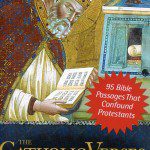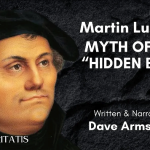- Ambrose
“There is hardly anything more deadly than being married to one who is a stranger to the faith,where the passions of lust and dissension and the evils of sacrilege are inflamed.Since the marriage ceremony ought to be sanctified by the priestly veiling and blessing,how can that be called a marriage ceremony where there is no agreement in faith?”
{To Vigilius, Letter 19:7 (A.D. 385), in FC, XXVI:176}
“No one is permitted to know a woman other than his wife. The marital right is given you for this reason: lest you fall into the snare and sin with a strange woman. ‘If you are bound to a wife do not seek a divorce’; for you are not permitted, while your wife lives, to marry another.”
(Abraham 1:7:59 [A.D. 387]).
“We do not say that marriage was not sanctified by Christ,since the Word of God says: ‘The two shall become one flesh’ and one spirit.But we are born before we are brought to our final goal,and the mystery of God’s operation is more excellent than the remedy for human weakness. Quite rightly is a good wife praised,but a pious virgin is more rightly preferred.”
{To Sircius, Letter 42:3 (A.D. 389), in FC, XXVI:225226}
“You dismiss your wife, therefore, as if by right and without being charged with wrongdoing; and you suppose it is proper for you to do so because no human law forbids it; but divine law forbids it. Anyone who obeys men ought to stand in awe of God. Hear the law of the Lord, which even they who propose our laws must obey: ‘What God has joined together let no man put asunder”‘
(Commentary on Luke 8:5 [A.D. 389]).
- Pacian
“And these are the nuptials of the Lord,so that like that great Sacrament they might become two in one flesh,Christ and the Church.From these nuptials a Christian people is born,when the Spirit of the Lord comes upon that people.”
{Sermon on Baptism, 6 (ante A.D. 392), in JUR, II:144}
- Jerome
“Do not tell me about the violence of the ravisher, about the persuasiveness of a mother, about the authority of a father, about the influence of relatives, about the intrigues and insolence of servants, or about household [financial] losses. So long as a husband lives, be he adulterer, be he sodomite, be he addicted to every kind of vice, if she left him on account of his crimes he is still her husband still and she may not take another”
(Letters 55:3 [A.D. 396]).
“Wherever there is fornication and a suspicion of fornication a wife is freely dismissed. Because it is always possible that someone may calumniate the innocent and, for the sake of a second joining in marriage, act in criminal fashion against the first, it is commanded that when the first wife is dismissed a second may not be taken while the first lives”
(Commentaries on Matthew 3:19:9 [A.D. 398]).
- Pope Innocent I
“[T]he practice is observed by all of regarding as an adulteress a woman who marries a second time while her husband yet lives, and permission to do penance is not granted her until one of them is dead”
(Letters 2:13:15 [A.D. 408]).
- Augustine
“Neither can it rightly be held that a husband who dismisses his wife because of fornication and marries another does not commit adultery. For there is also adultery on the part of those who, after the repudiation of their former wives because of fornication, marry others. This adultery, nevertheless, is certainly less serious than that of men who dismiss their wives for reasons other than fornication and take other wives. Therefore, when we say: ‘Whoever marries a woman dismissed by her husband for reason other than fornication commits adultery,’ undoubtedly we speak the truth. But we do not thereby acquit of this crime the man who marries a woman who was dismissed because of fornication. We do not doubt in the least that both are adulterers. We do indeed pronounce him an adulterer who dismissed his wife for cause other than fornication and marries another, nor do we thereby defend from the taint of this sin the man who dismissed his wife because of fornication and marries another. We recognize that both are adulterers, though the sin of one is more grave than that of the other. No one is so unreasonable to say that a man who marries a woman whose husband has dismissed her because of fornication is not an adulterer, while maintaining that a man who marries a woman dismissed without the ground of fornication is an adulterer. Both of these men are guilty of adultery”
(Adulterous Marriages 1:9:9 [A.D. 419]).
“A woman begins to be the wife of no later husband unless she has ceased to be the wife of a former one. She will cease to be the wife of a former one, however, if that husband should die, not if he commit fornication. A spouse, therefore, is lawfully dismissed for cause of fornication; but the bond of chastity remains. That is why a man is guilty of adultery if he marries a woman who has been dismissed even for this very reason of fornication”
(ibid., 2:4:4).
“It is certainly not fecundity only, the fruit of which consists of offspring, nor chastity only, whose bond is fidelity, but also a certain sacramental bond in marriage which is recommended to believers in wedlock. Accordingly it is en-joined by the apostle: ‘Husbands, love your wives, even as Christ also loved the Church.’ Of this bond the substance undoubtedly is this, that the man and the woman who are joined together in matrimony should remain inseparable as long as they live…”
{On Marriage and Concupiscence, 1,10 [11] (A.D. 420), in NPNF1,V:268}
“In marriage, however, let the blessings of marriage be loved: offspring, fidelity, and the sacramental bond. Offspring, not so much because it may be born, but because it can be reborn; for it is born to punishment unless it be reborn to life. Fidelity, but not such as even the unbelievers have among themselves, ardent as they are for the flesh. . . . The sacramental bond, which they lose neither through separation nor through adultery, this the -spouses should guard chastely and harmoniously”
(ibid., 1:17:19).
- Cyril of Alexandria
“When the wedding was celebrated [at Cana] it is clear that it was entirely decorous:for indeed,the Mother of the Savior was there;and,invited along with His disciples,the Savior too was there,working miracles more than being entertained in feasting,and especially that He might sanctify the very beginning of human generation,which certainly is a matter concerning the flesh.”
{Commentary on John, 2:1 (A.D. 429), in JUR, III:222}
- Pope Leo the Great
“And so a wife is different from a concubine, even as a bondwoman from a freewoman. For which reason also the Apostle in order to show the difference of these persons quotes from Genesis, where it is said to Abraham, ‘Cast out the bondwoman and her son: for the son of the bondwoman shall not be heir with my son Isaac.’ And hence, since the marriage tie was from the beginning so constituted as apart from the joining of the sexes to symbolize the mystic union of Christ and His Church, it is undoubted that that woman has no part in matrimony, in whose case it is shown that the mystery of marriage has not taken place.”
{To Rusticus, Epistle 167:4 (A.D. 459), in NPNF2, XII:110}
*****
Meta Description: Examination of exactly what the early Church up through the patristic period taught about the indissolubility of marriage & about divorce.
Meta Keywords: Divorce, marriage, matrimony, annulment, Eastern Christianity & divorce, Church history & divorce, indissolubility of valid marriage

















